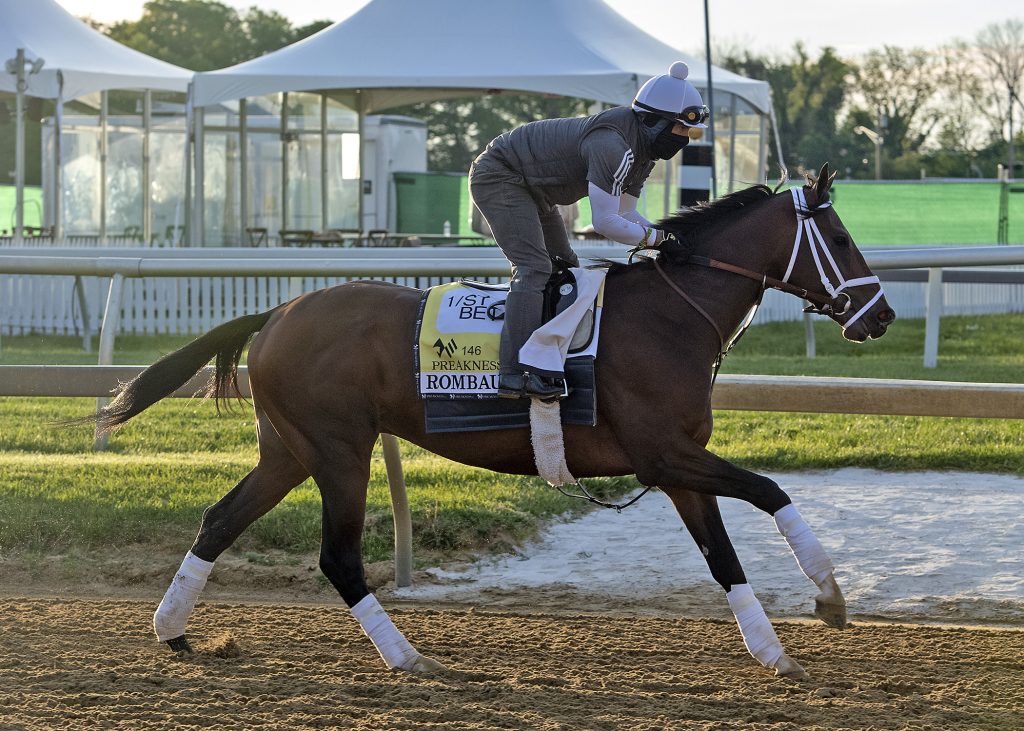
BALTIMORE, Md. – At this time a year ago, Diane and John Fradkin were trying to figure out what to do with the 2-year-old homebred colt they would later name Rombauer. A couple of unexpected turns, six races and $290,500 in purse earnings later, the versatile son of Twirling Candy has brought the Santa Ana, Calif. couple to Pimlico Race Course for Saturday’s 146th Preakness Stakes (G1).
Rombauer is their first starter in a Triple Crown race.
“That’s exciting,” John Fradkin said. “Generally speaking, we think of ourselves as small-time, commercial breeders. We aim to sell our progeny. This is a rarity. In the past we’ve pretty much only raced horses that we couldn’t sell. This is kind of an exception, just the way it all transpired.”
Rombauer earned a fees-paid entry into the Middle Jewel of the Triple Crown by winning the Feb. 13 El Camino Real Derby, a Preakness ‘Win & In’ event, at Golden Gate Fields. Most recently, he finished third in the Blue Grass (G2) on April 3 at Keeneland.
Under normal circumstances, the Fradkins would not be in Baltimore to watch their colt run in the Preakness. Because 2020 was anything but normal, the Fradkins did not sell the colt from their two-mare breeding operation. Due to the Covid-19 pandemic, the April OBS sale of 2-year-olds was delayed a couple of months.
Since the dam, Cashmere by Cowboy Cal, typically produced precocious babies that win early in their careers, consigner Eddie Woods advised the Fradkins to sell him in a private sale after he had proven himself at the track. They sent Rombauer to their trainer, Michael McCarthy, at Santa Anita. Rombauer promptly won his first career start at a mile on turf at Del Mar on July 25.
“He closed, he came home really well, and I honestly thought there would be some pretty big offers after that race,” Fradkin said. “But there weren’t because the time was really bad and the initial Beyer number they gave him was 48. The time was 1:38 and change (1:38.30). It didn’t really surprise me that there really weren’t any solid offers.”
Rombauer landed in the keeper category and is writing an interesting story.
“It was sort of two lucky breaks on our part that caused us to still own the horse,” Fradkin said. “There’s actually been substantial offers since that we’ve perhaps stupidly turned down.”
Rombauer had a troubled trip in his next start, the Del Mar Juvenile Turf Stakes on Sept. 6 and ended up sixth but beaten only two lengths. McCarthy recommended that they try Rombauer on dirt and he ended up second, three-quarters of a length back after a wide trip in the American Pharoah (G1) at Santa Anita. He completed his 2-year-old season with a fifth-place finish in the Breeders’ Cup Juvenile (G1) at Keeneland.
In late January, Fradkin told McCarthy that he wanted to opt out of the Robert B. Lewis (G3) and wait for the El Camino Real Derby.
“I thought it was going to be a much easier race,” Fradkin said. “We scratched out of the Robert Lewis because I thought the field was really, really tough. We had a pretty heated discussion about that. I thought that even if we ran it really well, we were likely to finish fifth because that was probably the best field ever assembled for 3-year-old colts for only $100,000. Two weeks later, we had a race up north for the same amount of purse money and I knew the field was going to be a lot easier. So that was my thinking. That continues to be my thinking, that I want to pick easier spots for the horse.”
Fradkin, who spent a handful of years as a professional horseplayer, was right: Medina Spirit, who went on to prevail in the Kentucky Derby, won the Robert Lewis. Hot Rod Charlie was third in both races.
“And I think if a horse runs his best race ever, he should be earning money,” he said. “I felt that probably would not have happened in the Robert B. Lewis and it probably wouldn’t have happened in the Kentucky Derby either. We could have run our best race ever and wouldn’t have made any money. So that’s why we’ve chosen the path we’ve chosen.”
The road to the Preakness began in the summer of 1993 when Fradkin claimed Ruff Hombre for $25,000 at Hollywood Park. He finished last in the race and was off for two months before winning what turned out to be his career finale at Del Mar. The Fradkins invested the earnings from Ruff Hombre’s win at the Keeneland September Sale in a skinny New Jersey-bred Afleet filly they named Ultrafleet. She failed to hit the board in her four starts.
“We decided to retire her and make her a broodmare,” Fradkin said. “Pretty much everybody said that was stupid, but we did it anyway and it turned out pretty well.”
Ultrafleet became the foundation mare for the Fradkins. She dropped 14 foals before her death in 2012. Among them were California Flag, who won the 2009 Breeders’ Cup Turf Sprint (G1), and graded stakes winner Cambiocorsa, who is the granddam of 2018 European Horse of the Year Roaring Lion. The Fradkins retained Cashmere, Ultrafleet’s next-to-last foal. Cashmere also produced Treasure Trove, who runs in the Pimlico Special (G3) on Friday.
Maryland Jockey Club Press Release
Photo: Rombauer (Maryland Jockey Club)



